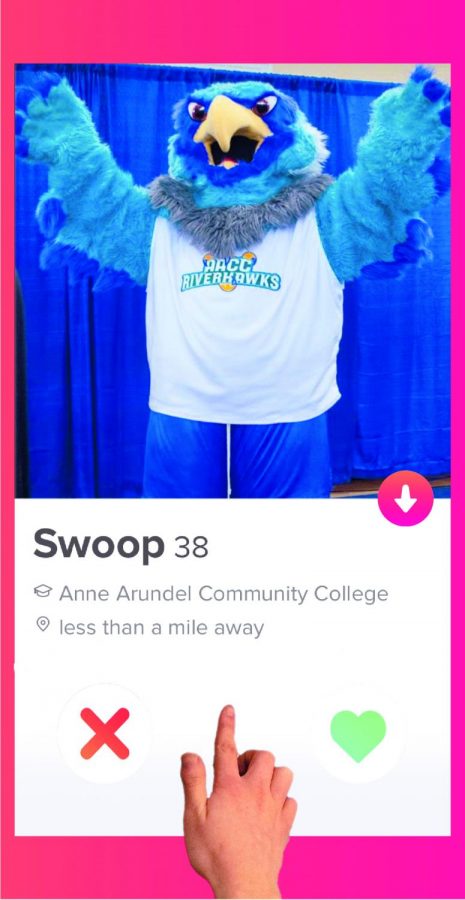Dating apps get lousy, good ratings by users
Photo by Roxanne Ready, graphic by Christina Browning
Some AACC students say they have had success with dating apps, while others dislike them.
April 30, 2019
A little more than a year ago, Lance Partridge signed up for Tinder as a joke. Little did he know he would end up swiping right into a serious relationship.
Partridge, a second-year nursing student, was tooling around on Tinder when Bethany Probst, a second-year communications student, in search of friends who live near Arnold, messaged him.
“I was just looking for people to message and I saw she was at the college,” Partridge said, “I was just joking around, I wasn’t expecting to find anything serious.”
The pair arranged to meet a couple of weeks later. But they bumped into each other on campus in the Truxal Library by chance.
“We were planning on hanging out [later] that day and I was in the library working on an English paper and I saw her walking by,” he said. “I had probably five minutes to finish my paper that was due and I was like, ‘Oh, that’s Bethany.’ So I went up to her and was like, ‘Hi, I’m Lance. I got to work on this so I’ll catch you later, though.’”
A year later, Partridge and Probst are living together.
Partridge found love on Tinder, but other AACC students said they don’t use dating apps because they aren’t comfortable meeting the people they connect with online.
In an informal poll of 62 students, 36 said they don’t use dating apps such as Tinder or Bumble.
Some students, like second-year general studies student Jimmy Garland, said they feel strongly against the use of dating apps.
“I don’t believe in Tinder,” Garland said. “Well, I believe it exists but I don’t believe in the concept. I only like face-to-face relationships.”
Tinder first appeared in April 2012, and according to the news site BusinessofApps, the online matchmaker had more than 57 million users worldwide in 2018. In comparison, Bumble, Tinder’s largest competitor, had 36 million users.
Other popular dating sites are OkCupid, Match and Coffee Meets Bagel.
Still, students, like second-year nursing student Ian Gambola, said they don’t use dating apps because they don’t believe the profiles are truthful.
Gambola said he doesn’t feel dating apps are authentic because a lot of the people on the platforms lie about their identity.
Gambola isn’t wrong. According to a study by students at the University of Wisconsin-Madison, 81 percent of people lie about their height, weight, age or other characteristics on their dating profiles.
Others said they fear falling victim to catfishing, which lures unsuspecting users into starting an online dialogue with someone who has invented a fictional profile and persona to trick others.
Before the age of dating apps, relationship-seekers could place “in search of” ads in newspapers and magazines. That practice began in a British agricultural journal in1685, according to PBS.
The first dating website was Match, which started in 1995. Still, Tinder had 48.8 million more users than Match in 2018, according to BusinessofApps.
Nine years after Match’s entrance, Facebook completely changed social media, offering users a new way to stay connected with friends and family and to meet people across the world.
AACC sociology professor Gina Finelli communicating online has its positives and negatives.
“People from the past are always looking at it like, ‘Oh no; we’re getting away from how we communicate with people in a way that’s more personal,’” Finelli said. “And [online] can really be just as personal.”
Finelli added that everyone, even college students, need time to adjust to new trends such as using dating apps to find potential relationships.
“When things do first get introduced I think we struggle a bit more with how to use that in a way that’s effective,” she said. “I think after some time it starts to become more useful, because online dating for a while had a big stigma attached to it. I don’t think it does anymore.”
First-year psychology student Tracie Lewis said she sees the positive side of dating apps.
“I think for people who are having a hard time connecting with people [dating apps] are a good thing,” she said.
First-year biology student Douglas Nesler agreed dating apps can be good for people who struggle with the confidence to start face-to-face discussions.
“I don’t see any problem with it, especially with people who don’t have those outgoing social skills,” Nesler said.
While second-year public health student Faith Hamilton uses dating apps, she advises others to be cautious when they meet their matches in person.
“Be careful,” Hamilton said. “Make sure to verify who you’re talking to before meeting them.”
Second-year economics student Carina Schaban agreed.
“I just don’t think it’s safe,” Schaban said. “I have some friends that use them and sometimes its unsafe and just weird.”
edits/ May 1 3:05 p.m. -Added quotes and information cut from physical edition for space












